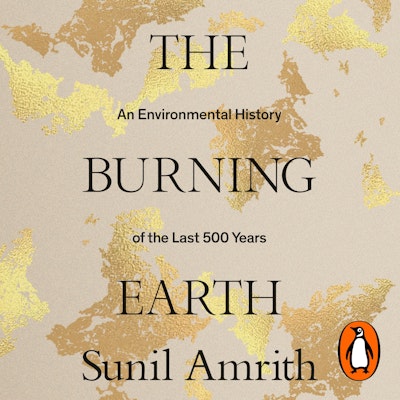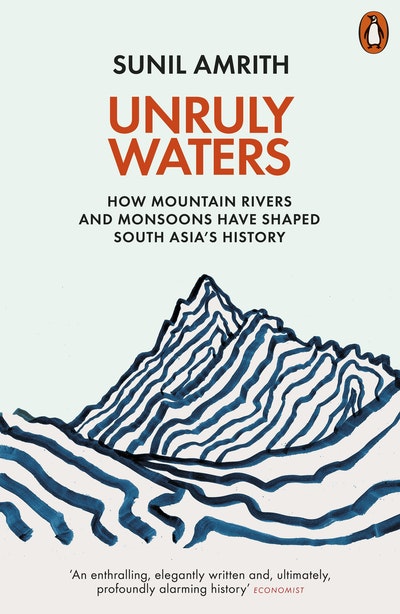- Published: 5 September 2024
- ISBN: 9781802066593
- Imprint: Penguin Audio
- Format: Audio Download
- RRP: $32.00
The Burning Earth
An Environmental History of the Last 500 Years
- Published: 5 September 2024
- ISBN: 9781802066593
- Imprint: Penguin Audio
- Format: Audio Download
- RRP: $32.00
The Burning Earth, which is nothing short of a history of the world, is as beautiful as it is indispensable, as breathtaking as it is devastating. It answers questions most of us have been too daft even to ask. It will set you on fire
Jill Lepore, author of These Truths: A History of the United States
The Burning Earth is a marvelously erudite and wide-ranging account of the steadily accelerating ecological transformation of the planet since the twelfth century. An indispensable contribution to both environmental and global history
Amitav Ghosh, author of The Great Derangement
A devastating panorama of human folly, a poetic meditation on how the search for freedom from nature undermined the very conditions for life on earth. Beautifully written, Sunil Amrith’s global and long-term view is crucial to understanding the environmental predicaments we are in, and, perhaps, to restore a distraught world. A must read for anyone concerned with the state of the planet
Sven Beckert, author of Empire of Cotton
A wrenching, clear-eyed reckoning with humanity’s extractive relationship to the natural world that plants seeds of insight on how we can shift to an ethos of regeneration and repair. Every page challenges us to conceive the future we want for the planet...and ourselves
Kate Orff, author of Toward an Urban Ecology
Memorable and mesmerizing. Sunil Amrith has gifted us a page-turner of a book, written with passionate lucidity. Historically deep and geographically generous, The Burning Earth dramatizes human freedom’s profound dependence on the health and integrity of our environments. Amrith’s capacious insights and his worldly perspective make this a standout title for anyone interested in the long arc of environmental justice
Rob Nixon, author of Slow Violence and the Environmentalism of the Poor
Ranging from the Mongol expansion to contemporary climate change, Amrith has given us the most readable global environmental history yet. With an eye for the telling detail combined with a sense of the big picture, this book brings environmental perspectives together with such major world historical themes as empire, freedom and energy. A towering achievement and a joy to read
J.R. McNeill
[A] magisterial historical review [....] Amrith writes from an environmental history perspective, and with an impassioned sense of social justice, about a wide range of subjects, including agriculture, assassination, colonialization, disease, freedom, hunger, politics, pollution, slavery, urbanization, and war
Lawrence D. Meinert, Science
[The Burning Earth] is an environmentally focused chronicle of the eras of colonization and industrialization that probes the dual natures of war and resource extraction, ecological degradation and human mass migration, and technological improvement and planetary devastation
Publisher's Weekly
A far-reaching survey of the central role played by human needs and desires in the destruction of Earth
Kirkus Reviews
An epic exploration of human innovation and destruction [which] examines how the poor and powerless have fought back — time and again — against those seeking to profit from the planet’s natural resources
Josie Glausiusz, Nature
Both dizzying and deracinating, but also, even in its grimness, quite thrilling… What sets Amrith’s history apart is that he gives himself no fixed place to stand. He refuses to occupy a Eurocentric viewpoint, or any other developing instead a planetary awareness… Amrith’s panopticon-like vision is one we need to adopt as we must assume responsibility for the health of the planet… [his] reading is astonishing
Kathleen Jamie, New Statesman
A must-read history of our environmental crisis... [Amrith is an] engaging guide, with a lyrical style and a talent for storytelling... It is beautifully and clearly written, well-researched and finds new perspectives on much-discussed issues. Strongly recommended
Michael Marshall, New Scientist
[An] expansive book... Amrith recognizes the inseparability of environmental distress and political, economic, and social factors
The New York Times
Sunil Amrith’s The Burning Earth bristles with indignation... The history that Amrith covers is uncompromising, and he places the sins of environmental change on the insatiable greed of Europeans... [Amrith] is a scholar who writes with conviction
Peter Frankopan, The Spectator
This bleak, stunningly written book shows that the other side of the coin called progress is destruction. Amrith writes like the finest novelist, and his grasp of a mind-boggling expanse of material is deeply impressive
Neel Mukherjee, New Statesman
Written with passion and insight, [The Burning Earth] is a highly readable grand narrative illustrated by vignettes from across the globe.
David Reynolds, New Statesman
This year hasn’t been a great one for the environment, so a book about the long history of environmental damage may be a hard sell. However, this isn’t just a litany of woe. It unpicks the ways environmental harms have been driven by social systems and individual mentalities. In doing so, it points the way to a better society: one that no longer wages war on nature
Michael Marshall, New Scientist
[A] thorough and accessible survey… The Burning Earth is a welcome complement to important historical critiques of social injustice and inequality by authors like Howard Zinn and Eduardo Galeano
Ramin Skibba, Undark
Devastating and essential… In Amrith’s telling, human and environmental consequences are inseparable
Priscilla Long, American Scholar
As a historian, Sunil Amrith provides readers with a narrative that spans continents and centuries, calling out exploiters with compassion for the exploited. And if all history is environmental history, we all are authors of this next critical chapter
John Yunker, EcoLit Books
[A] magisterial historical review… Amrith writes from an environmental history perspective, and with an impassioned sense of social justice, about a wide range of subjects, including agriculture, assassination, colonialization, disease, freedom, hunger, politics, pollution, slavery, urbanization, and war
Lawrence D. Melnert, Science
Beautifully written… Sunil Amrith’s The Burning Earth takes us on a gloomy and bleak tour of how, in the name of progress, Western empires made a mess of everything
Michael Ledger-Lomas, Jacobin
The Burning Earth is a global history of the human destruction of the Earth in the pursuit of profit, as well as a sweeping account of how major technological advances have both improved and decimated human life. It’s a richly detailed story that tries to explain how we got to where we are today, so imperiled by the impacts of climate change, while also offering the possibility of new ways of flourishing on the planet
Yale News
In this expansive book, a historian places the earth’s ecological plight in the context of human exploitation
The New Yorker
Masterful, readable, far-reaching
Tom Gatti, The <i> Observer </i> 25 Best Books of the Century




